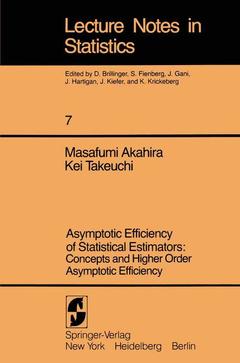Description
Asymptotic Efficiency of Statistical Estimators: Concepts and Higher Order Asymptotic Efficiency, Softcover reprint of the original 1st ed. 1981
Concepts and Higher Order Asymptotic Efficiency
Lecture Notes in Statistics Series, Vol. 7
Authors: Akahira Masafumi, Takeuchi Kei
Language: English52.74 €
Subject to availability at the publisher.
Add to cart
Publication date: 06-1981
242 p. · 15.2x22.9 cm · Paperback
242 p. · 15.2x22.9 cm · Paperback
Description
/li>Contents
/li>
This monograph is a collection of results recently obtained by the authors. Most of these have been published, while others are awaitlng publication. Our investigation has two main purposes. Firstly, we discuss higher order asymptotic efficiency of estimators in regular situa tions. In these situations it is known that the maximum likelihood estimator (MLE) is asymptotically efficient in some (not always specified) sense. However, there exists here a whole class of asymptotically efficient estimators which are thus asymptotically equivalent to the MLE. It is required to make finer distinctions among the estimators, by considering higher order terms in the expansions of their asymptotic distributions. Secondly, we discuss asymptotically efficient estimators in non regular situations. These are situations where the MLE or other estimators are not asymptotically normally distributed, or where l 2 their order of convergence (or consistency) is not n / , as in the regular cases. It is necessary to redefine the concept of asympto tic efficiency, together with the concept of the maximum order of consistency. Under the new definition as asymptotically efficient estimator may not always exist. We have not attempted to tell the whole story in a systematic way. The field of asymptotic theory in statistical estimation is relatively uncultivated. So, we have tried to focus attention on such aspects of our recent results which throw light on the area.
1. General discussion.- 1.1. The concept of asymptotic efficiency.- 1.2. Multidimensional parameter case.- 1.3. Higher order asymptotic efficiency.- 1.4. The estimators in the classes C and D.- 1.5. More general cases.- 2. Consistency of estimators and order of consistency.- 2.1. Notation and definition.- 2.2. Necessary conditions for consistency of estimators.- 2.3. Consistent estimators with order cn.- 2.4. Order of convergence of cn -consistent estimators for the location parameter case.- 2.5. Bounds for the order of convergence of consistent estimators.- 2.6. Order of convergence of consistent estimators in an autoregressive process.- 3. Asymptotic efficiency.- 3.1. Definitions and existence.- 3.2. Asymptotic efficiency in an autoregressive process.- 3.3. Asymptotic efficiency and inefficiency of maximum probability estimators.- 4. Higher order asymptotic efficiency.- 4.1. Second order asymptotic efficiency.- 4.2. Third order asymptotic efficiency.- 4.3. Second order asymptotic efficiency of estimators when Xi’s are not i.i.d..- 4.4. Second order asymptotic efficiency of estimators in multiparameter cases.- 4.5. Second order asymptotic efficiency in an autoregressive process.- 5. Second order and third order asymptotic efficiency of the maximum likelihood estimator and other esti- mators.- 5.1. Third order asymptotic efficiency of the maximum likelihood estimator for the multiparameter exponential case.- 5.2. Third order asymptotic efficiency of maximum likelihood estimators in general cases.- 5.3. Second and third order asymptotic efficiency of the generalized Bayes estimator.- 5.4. Third order asymptotic efficiency of maximum likelihood estimators in multivariate linear regression models.- 6. Discretized likelihood methods.- 6.1. Discretized likelihood estimator(DLE).- 6.2. Second order asymptotic efficiency of DLE.- 6.3. Third order asymptotic efficiency of DLE.- 6.4. Maximum log-likelihood estimator.- 6.5. Remarks.- 7. Higher order asymptotic efficiency and asymptotic completeness.- 7.1. The concept of asymptotic completeness of an estimator.- 7.2. Second order asymptotic efficiency of unbiased confidence intervals.- 7.3. Concluding remarks.- References.
© 2024 LAVOISIER S.A.S.
These books may interest you

Martingale Methods in Statistics 123.78 €




